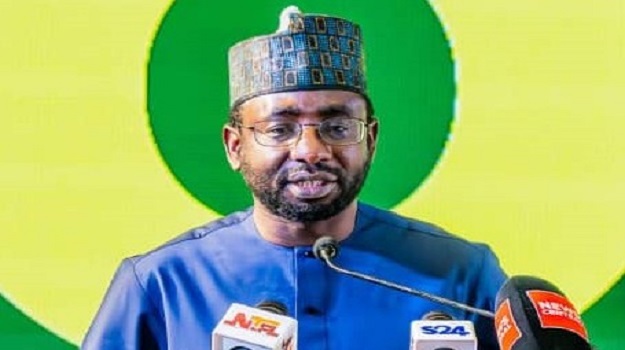E-Business
Kaymu’s Deputy MD Links SME Growth to Efficient Delivery System

In recent times electronic commerce has become a significant tool in unlocking job creation and innovation for small and medium sized enterprises (SMEs) in Nigeria.
E-commerce and mobile commerce have dramatically changed the way small businesses reach customers, making it faster and easier for consumers to make purchases on the go while avoiding the hassles of going to the store.
This process, Evangeline Wiles, deputy managing director, Kaymu.com, said that, was made possible due to improved service delivery system adopted by various small and medium enterprises.
The online marketplace provides a springboard for SMEs, transcending local and regional boundaries to attain a global reach.
Many SMEs are taking advantage of the opportunities afforded by e-commerce to tap into a bigger clientele, new market and increase their revenue.
“We’re now living in a time when competition is driving brands to innovate, giving their customers better products, customizable options, efficient delivery and more purchasing channels to choose from.
“Large retailers have set the bar high for SMEs who are just looking to break into the e-commerce market. For small retailers one of the most pressing challenges faced is poor delivery and tracking system” stated Wiles.
The proliferation of SMEs into e-commerce presents new challenges for this sector that do not have the capacity to overcome them unassisted.
According to Wiles, “One of the major challenges faced by SMEs remains inefficient delivery system”. For an online marketplace such as Kaymu that provides a platform for buyers and sellers to conduct business transactions, we have seen cases whereby the seller has a good product offering, great image quality and the most competitive price but does not have the capacity to deliver”.
To address the challenges, e-commerce platforms have to provide technical assistance to sellers on their platforms by providing SMEs market intelligence, spotting opportunities and developing specific delivery solutions for SMEs to effectively work in the online marketplace.
“This is a call for delivery companies and systems to operate a functional delivery process that facilitates prompt and efficient delivery and tracking system as this is pertinent to SME growth”, Wiles concluded.
Kaymu is Nigeria’s leading safest online market place where buyers and sellers can meet and make the best deals for used or new products, such as smart phones, computers, shoes and clothing, home appliances for the cheapest price thanks to the fixed or auction pricing system.
E-Business
Kaspersky Introduces Cyber Pathways to Support Career Development in Cybersecurity

Kaspersky’s new platform, ‘Cyber Pathways’, offers a comprehensive look into the essential cybersecurity roles, skills, and tools, to empower professionals to chart their career paths with confidence.

Featuring an interactive guidance test and personalised learning recommendations, the resource helps users to discover their ideal cybersecurity role. This platform is equally useful for newcomers to cybersecurity, IT generalists, seasoned experts and corporate organisations.
According to a global Kaspersky study, a staggering 41% of companies report that their cybersecurity teams are significantly understaffed, primarily due to a shortage of qualified professionals capable of handling complex challenges.
This talent gap is further echoed by the fact that 49% of cybersecurity experts see a pressing need for more practical training opportunities to enhance their skills and venture into new, more demanding areas.
Recognising the crucial role of expertise in closing this gap, Kaspersky introduces its new digital project ‘Cyber Pathways’, a comprehensive interactive platform designed to empower cybersecurity professionals at all levels.
‘Cyber Pathways’ is a digital platform that offers an in-depth overview of key cybersecurity spheres and spotlights the vital hard and soft skills essential for success in each area.
It highlights core responsibilities and introduces key tools and solutions utilised in these roles. It also offers practically oriented educational courses tailored to expand knowledge and sharpen skills in a chosen cybersecurity field.
Key cybersecurity spheres are reviewed in the ‘Kaspersky Cyber Heroes’ part, each embodying a vital area of cybersecurity: threat intelligence, malware analysis, security operations, security assessment, network security, and information security research.
These heroes are designed to help professionals understand the unique characteristics of each role and identify the key competencies required to succeed in them.
Career guidance test in an engaging and interactive form enables professionals to assess their current expertise level and identify the cybersecurity role that best matches their strengths and aspirations.
The platform offers three tailored test options, catering to different levels of expertise: for beginners in cybersecurity, for advanced professionals, and for organisations.
Building on nearly three decades of unmatched experience and extensive historical data, Kaspersky has developed a unique expertise that not only protects against the most dangerous cyber threats and guarantees top-tier product quality, but also empowers cybersecurity professionals worldwide to enhance their knowledge and stay ahead of cybercriminals.
Rooted in this expertise, the educational recommendations provided on this platform combine highly practical, hands-on programmes from Kaspersky Cybersecurity Training and Kaspersky Academy.
Designed to equip professionals with the critical skills needed to combat sophisticated threats, these initiatives ensure that their skills remain sharp, current, and ready for any challenge.
Additionally, these recommendations include valuable resources for corporate organisations, featuring online tools from Kaspersky Security Awareness that promote cybersecurity-conscious behaviours within teams and foster a resilient security culture.
E-Business
FCCPC Sets Deadline for Digital Lending Regulatory Compliance

Federal Competition and Consumer Protection Commission (FCCPC) has announced Monday, January 5, 2026, as the final deadline for full compliance with the Digital, Electronic, Online, and Non-Traditional Consumer Lending Regulations, 2025.

In a statement signed by Ondaje Ijagwu, director of Corporate Affairs, the Commission said that the Regulations took effect on July 21, 2025, pursuant to the Federal Competition and Consumer Protection Act (FCCPA) 2018.
According to the statement, the new framework is designed to promote fairness, transparency, and accountability within Nigeria’s expanding digital lending ecosystem.
To facilitate compliance, the Commission has also released an accompanying instrument, the Guidelines on the Digital, Electronic, Online, and Non-Traditional Consumer Lending Regulations, 2025, issued under Sections 17 and 163 of the FCCPA.
“This document provides practical direction for lenders and intermediaries, explains the documentation required, and introduces updated Forms 1 and 3 based on feedback received from stakeholders,” the statement noted.
The FCCPC added that applicants with pending submissions may supplement their filings with any additional information required under the new Guidelines without waiting for formal requests.
It assured them that applications would continue to be processed promptly and transparently.
Speaking on the compliance timeline, Mr Tunji Bello, executive vice chairman of the FCCPC, underscored the importance of adhering to the January 5 deadline.
“Full compliance is not only a legal requirement but an important step in protecting consumers and ensuring that the sector continues to grow in a fair and responsible manner,” Bello said. “Operators have had ample time to adjust to the Regulations and the additional guidance now provided. We expect all obligations to be met before the deadline.”
The Commission emphasised that all affected operators, including digital lending platforms, service partners, and intermediaries, must complete their compliance obligations before the stated date.
It warned that enforcement actions will commence immediately after the deadline, including restricting non-compliant entities from operating, directing partners or platforms to cease dealings with them, and imposing other sanctions permitted under the law.
Copies of the Guidelines, Forms, and Frequently Asked Questions (FAQs) are available on the FCCPC websit: www.fccpc.gov.ng, as well as at the Commission’s offices nationwide.
E-Business
NITDA DG Tasks Youths to Drive Africa’s Digital Transformation

Kashifu Inuwa, CCIE, Director General of the National Information Technology Development Agency (NITDA), has urged Nigerian youth to take the lead in driving Africa’s digital transformation, emphasising that the nation’s young population holds the key to a prosperous and inclusive future.

Delivering his opening remarks at the three-day Digital Nigeria International Conference and Exhibition 2025 at the Bola Ahmed Tinubu International Conference Centre in Abuja, Inuwa extended heartfelt appreciation to the Vice President of the Federal Republic of Nigeria for his presence, describing it as a powerful demonstration that this administration cares deeply about our youth.
The conference provides a dynamic platform for ecosystem stakeholders to showcase their work and explore emerging trends aimed at transforming the nation and continent’s digital future.
Organised by NITDA, the Digital Nigeria Conference serves as a platform that bridges government and industry, fostering collaboration between policymakers, innovators, and private-sector leaders. It aims to harmonise regulatory frameworks, promote public–private partnerships, and drive the effective implementation of Nigeria’s national digital strategies for inclusive and sustainable growth.
Inuwa noted that the conference’s theme, Innovation for a Sustainable Digital Future: Accelerating Growth, Inclusion, and Global Competitiveness, aligns with President Bola Ahmed Tinubu’s Renewed Hope Agenda, particularly its focus on economic diversification through digitalisation, industrialisation and innovation.
Dr Bosun Tijani, the Minister of Communications, Innovation and Digital Economy, also speaking at the event reiterated the Federal Government’s commitment to building a sustainable, inclusive, and globally competitive digital economy, calling on stakeholders across sectors to work together to achieve Nigeria’s digital transformation goals.
Dr Tijani described the annual gathering as more than a conventional technology conference. According to him, Digital Nigeria serves as a national platform for dialogue, collaboration, and actionable strategies that will shape the country’s future in the digital era.
“It is with great pleasure that I welcome you all to Digital Nigeria 2025, something I consider to be a dialogue, but also collaboration and action towards building a sustainable, inclusive, and globally competitive digital economy for our nation. This event reminds us of what digital truly means for our past as a people, our present reality, and the future we are striving to build,” he mentioned.
Dr Tijani took the audience on a reflective journey through Nigeria’s digital history, noting that the liberalisation of the telecommunications industry in 1999 was a bold, transformative decision that changed the trajectory of the nation’s economy.
“That decision marked the beginning of a new economy built on ideas and innovation. The introduction of mobile connectivity reshaped how Nigerians live, work, and connect, fuelling a digital revolution that continues to expand opportunities for millions,” the Minister explained.
He emphasised that the ripple effect of that single reform continues to be felt across sectors and further noted that the digital economy now contributes about 18 percent to Nigeria’s Gross Domestic Product (GDP), a clear demonstration of the sector’s growing importance as a driver of national growth and economic diversification.
He also highlighted Nigeria’s global leadership in financial technology (fintech) innovation, citing the country’s advanced digital payment systems and thriving startup ecosystem.
“Today, Nigeria boasts one of the most efficient and responsive payment systems in the world. Transactions that take hours or even days elsewhere are completed instantly here. This innovation has produced five of Africa’s nine technology unicorns, companies each valued at over a billion dollars,” Tijani stated.
Senator Kashim Shettima, the Nigerian Vice President, in his remarks stated that the country is on the cusp of a historic transformation as the government advances toward passing the National Digital Economy and E-Governance Bill into law.
He described the bill as a cornerstone of the nation’s ambition to build a $1 trillion economy powered by digital innovation. Emphasizing its significance, he noted that the bill represents more than legislative reform—it is “a strategic leap toward embedding technology into the fabric of governance, economic planning, and national development.”
Drawing a compelling parallel with Nigeria’s cashless policy, which catalysed the fintech revolution, the Vice President said the anticipated impact of the new bill would ignite a govtech revolution.
“Just as the cashless policy unlocked the fintech revolution, this new bill will unlock the govtech revolution—an era of smarter governance, greater transparency, and inclusive service delivery,” he declared.
He explained that this new era would be defined by smarter governance, greater transparency, and inclusive service delivery, all driven by digital tools and infrastructure. He stressed that the bill is part of a broader national strategy to position Nigeria as a global leader in digital innovation, with the potential to transform every sector of society.
He highlighted that Nigeria, with over 220 million people and an average age of 18, stands at a critical crossroads, one that could either unleash unprecedented prosperity or deepen socio-economic challenges if the nation fails to harness the creativity of its youth.
“If we harness the energy, the creativity and talent of our youth, we are not just going to power Nigeria, but we can power the entire Africa into a new era of prosperity. But if we fail to do that, if we fail to skill our youth, if we fail to provide a platform for them to create value, we are stunting the most valuable asset we have as a nation,” he noted.
The NITDA DG revealed that the 2025 edition of the conference has attracted over 4,800 participants from 12 countries and 25 Nigerian states, making it both a national and international gathering of innovators, policymakers, and investors.
He said, “This year’s event features 12 keynote sessions, 23 panel discussions, five workshops, and two expert masterclasses across five thematic tracks.”

 Telecom1 day ago
Telecom1 day agoT2 Condemns Misrepresentation of Industry Facts, the Spread of Disinformation Regarding IHS and Network Operations

 General News1 day ago
General News1 day agoIHS Nigeria, FCT-HSES Begin Distribution of Smart Cooking Gas as Part of “Breathe Clean Air, Abuja” Campaign

 News1 day ago
News1 day agoNigerian Man Sentenced in U.S. for Sextortion Scheme Leading to Death of American Student

 Telecom1 day ago
Telecom1 day agoMTN Nigeria, WWF/NCF and UNDP Nigeria Announce the Top 10 Finalists of 2025 Nigeria PachiPanda Challenge

 General News1 day ago
General News1 day agoPrince Edward Hosts Global Youth Forum in Lagos, Champions Expansion of Duke of Edinburgh’s Award

 Telecom1 day ago
Telecom1 day agoT2 Debunks Viral Posts on IHS Towers, Affirms Network Stability

 E-Financial1 day ago
E-Financial1 day agoSERAP Demands Answers over Missing N3 Trillion in CBN Account

 Telecom1 day ago
Telecom1 day agoTelecoms Industry Cuts 383 Jobs in One Year



























